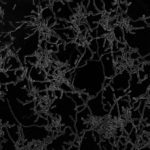Lien vers Pubmed [PMID] – 32459615
Lien vers HAL – pasteur-03222736
Lien DOI – 10.1099/jmm.0.001200
Journal of Medical Microbiology, 2020, 69 (6), pp.844 - 849. ⟨10.1099/jmm.0.001200⟩
Introduction. Signal transducer and activator of transcription 3 (STAT3) deficiency is a rare primary immunodeficiency associated with increased susceptibility to bacterial and fungal infections, notably pulmonary aspergillosis. Aim. We describe the emergence of azole-resistant Aspergillus fumigatus infections in STAT3-deficient patients. Methodology. During a retrospective study of 13 pulmonary aspergillosis cases in STAT3-deficient patients conducted in France, we identified patients infected with azole-resistant A. fumigatus isolates. Results. Two out of the 13 STAT3-deficient patients with aspergillosis had azole-resistant A. fumigatus infection, indicating an unexpectedly high prevalence of resistance. The first patient with STAT3 deficiency presented several flares of allergic bronchopulmonary aspergillosis-like episodes. He was chronically infected with two azole-resistant A. fumigatus isolates (TR34/L98). Despite prolonged antifungal treatment, including caspofungin and amphotericin B, the patient was not able to clear the azoleresistant A. fumigatus. The second patient had chronic cavitary pulmonary aspergillosis (CCPA). The A. fumigatus isolate was initially azole susceptible but harboured three F46Y, M172V and E427K point mutations. Despite prolonged antifungal therapies, lesions worsened and the isolate became resistant to all azoles. Surgery and caspofungin treatments were then required to cure CCPA. Resistance was probably acquired from the environment (TR34/L98) in the first case whereas resistance developed under antifungal treatments in the second case. These infections required long-term antifungal treatments and surgery. Conclusions. The emergence of azole-resistant A. fumigatus infections in STAT3-deficiency dramatically impacts both curative and prophylactic antifungal strategies. Physicians following patients with primary immune-deficiencies should be aware of this emerging problem as it complicates management of the patient.


